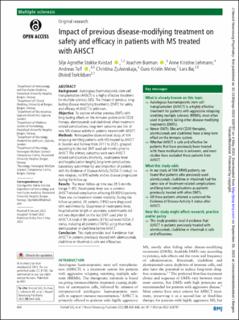| dc.contributor.author | Stokke, Silje Agnethe | |
| dc.contributor.author | Burman, Joachim | |
| dc.contributor.author | Lehmann, Anne Kristine | |
| dc.contributor.author | Tolf, Andreas | |
| dc.contributor.author | Zjukovskaja, Christina | |
| dc.contributor.author | Melve, Guro Kristin | |
| dc.contributor.author | Bø, Lars | |
| dc.contributor.author | Torkildsen, Øivind | |
| dc.date.accessioned | 2022-09-28T12:27:07Z | |
| dc.date.available | 2022-09-28T12:27:07Z | |
| dc.date.created | 2022-08-31T20:13:17Z | |
| dc.date.issued | 2022 | |
| dc.identifier.issn | 0022-3050 | |
| dc.identifier.uri | https://hdl.handle.net/11250/3022222 | |
| dc.description.abstract | Background Autologous haematopoietic stem cell transplantation (AHSCT) is a highly effective treatment for multiple sclerosis (MS). The impact of previous long-lasting disease-modifying treatments (DMT) for safety and efficacy of AHSCT is unknown.
Objective To explore whether previous DMTs with long-lasting effects on the immune system (anti-CD20 therapy, alemtuzumab and cladribine) affect treatment-related complications, long-term outcome and risk of new MS disease activity in patients treated with AHSCT.
Methods Retrospective observational study of 104 relapsing remitting patients with MS treated by AHSCT in Sweden and Norway from 2011 to 2021, grouped according to the last DMT used ≤6 months prior to AHSCT. The primary outcomes were early AHSCT-related complications (mortality, neutropenic fever and hospitalisation length), long-term complications (secondary autoimmunity) and proportion of patients with No Evidence of Disease Activity (NEDA-3 status): no new relapses, no MRI activity and no disease progression during the follow-up.
Results The mean follow-up time was 39.5 months (range 1–95). Neutropenic fever was a common AHSCT-related complication affecting 69 (66%) patients. There was no treatment-related mortality. During the follow-up period, 20 patients (19%) were diagnosed with autoimmunity. Occurrence of neutropenic fever, hospitalisation length or secondary autoimmunity did not vary dependent on the last DMT used prior to AHSCT. A total of 84 patients (81%) achieved NEDA-3 status, including all patients (100%) using rituximab, alemtuzumab or cladribine before AHSCT.
Conclusion This study provides level 4 evidence that AHSCT in patients previously treated with alemtuzumab, cladribine or rituximab is safe and efficacious. | en_US |
| dc.language.iso | eng | en_US |
| dc.publisher | BMJ | en_US |
| dc.rights | Navngivelse-Ikkekommersiell 4.0 Internasjonal | * |
| dc.rights.uri | http://creativecommons.org/licenses/by-nc/4.0/deed.no | * |
| dc.title | Impact of previous disease-modifying treatment on safety and efficacy in patients with MS treated with AHSCT | en_US |
| dc.type | Journal article | en_US |
| dc.type | Peer reviewed | en_US |
| dc.description.version | publishedVersion | en_US |
| dc.rights.holder | Copyright 2022 The Author(s) | en_US |
| cristin.ispublished | true | |
| cristin.fulltext | original | |
| cristin.qualitycode | 2 | |
| dc.identifier.doi | 10.1136/jnnp-2022-328797 | |
| dc.identifier.cristin | 2047728 | |
| dc.source.journal | Journal of Neurology, Neurosurgery and Psychiatry | en_US |
| dc.source.pagenumber | 844-848 | en_US |
| dc.identifier.citation | Journal of Neurology, Neurosurgery and Psychiatry. 2022, 93, 844-848. | en_US |
| dc.source.volume | 93 | en_US |

